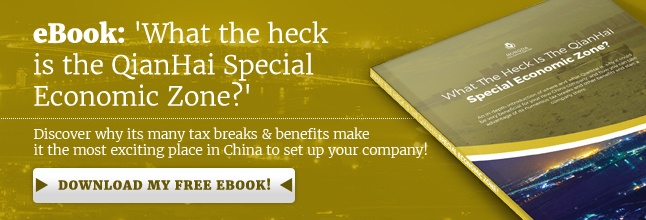The rates of China taxes for both expat employees and businesses are perhaps higher than you'd imagine.
For instance, expats can expect to pay between 25% to 45% IIT (Individual Income Tax) on earnings, and companies have a CIT (Corporate Income Tax) rate of 25%.
Can we reduce these? Yes. Here's how...
2 Great Ways To Reduce China Taxes
Our two ideas are based on location, but one is good for lower taxes for staff and companies, whereas the others are better suited only to companies.
China has a habit of building special 'low tax' zones which have a specific purpose, whether it's to encourage foreign investment, or specific industries to flourish, chances are that there's a special zone in the area of China that you're interested in being based in that may be suitable.
1. Set Up In The QianHai Special Economic Zone in Shenzhen (Company & Staff Tax Reductions)
We have written many blog posts on the QianHai special economic zone so there's no point in going over its benefits and drawbacks in great detail here again.
However, one of its key features for foreign investors is that it is a low tax zone.
Lower CIT Rate
It offers a lower CIT rate of 15% for companies, that's comparable to if you opened a company in Hong Kong or Singapore, which fall into one of its preferred industry categories, such as green technology, finance, and modern logistics (there are more), and make at least 70% of their revenue from that business.
If you qualify for this lower tax rate, do bear in mind that you will pay the regular rate of of monthly CIT as normal (25%) and then the QianHai local government will reimburse the difference to you at the end of the financial year. Read this post to learn more about applying for the CIT reduction in QianHai.
Lower IIT Rate
Similar to companies, IIT for expats is pegged at 15%, making QianHai a great place to work for foreign experts.
Consider this example, a high earner on a monthly salary of, say, 100,000RMB will be paying China's top rate IIT of 45% (it's stepped, this isn't on the entire taxable income).
If they're paying 15% in QianHai that's a tax reduction of 30%. That is huge, and will help you, and China, to attract the very best staff to Shenzhen.
Learn more about if QianHai is right for you in our free guide, click below to get it:
2. Choose To Open A Company In Lower CIT Areas Around China
Certain cities and regions have also lowered CIT in a bid to encourage more investment there. Perhaps these might be suitable for your needs?
- Shanghai = 10%
- Tibet (province) = 9%
- Xinjiang (province) = 0%
Shanghai is an interesting one, as of course this is a major world city, manufacturing, and logistics hub. We expect this to make it even more popular as a base for foreign investors to open their Chinese company.
However the other two regions aren't ones that you'd normally expect many foreign companies to open up in, but you can.
China's wish to encourage industry and commerce to move away from the East into its sparsely-populated West isn't new, but these tax reductions show real intent.
Xinjiang is even tax-free! Bearing in mind its importance in the belt and road initiative, with rail links and logistics from China to Europe, could this become a new hot-spot for foreign investors?
Your Thoughts?
Would you consider any of these areas for your Chinese company? Why, or why not?
If you have questions about setting up shop in QianHai (in Shenzhen), Shanghai, or anywhere else in China, feel free to contact us for a no-strings chat, we're here to help.






